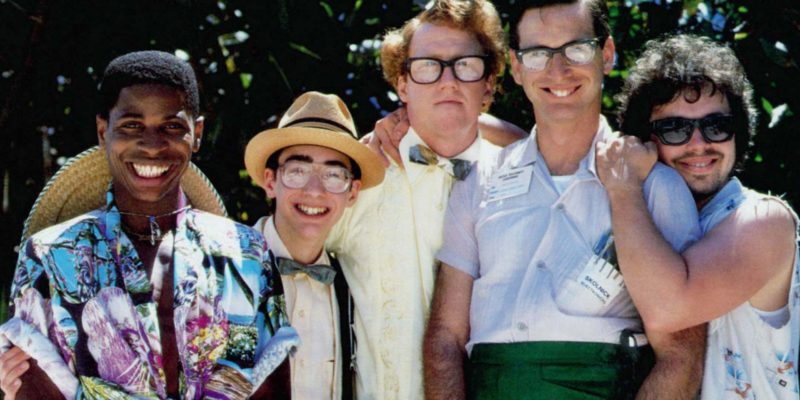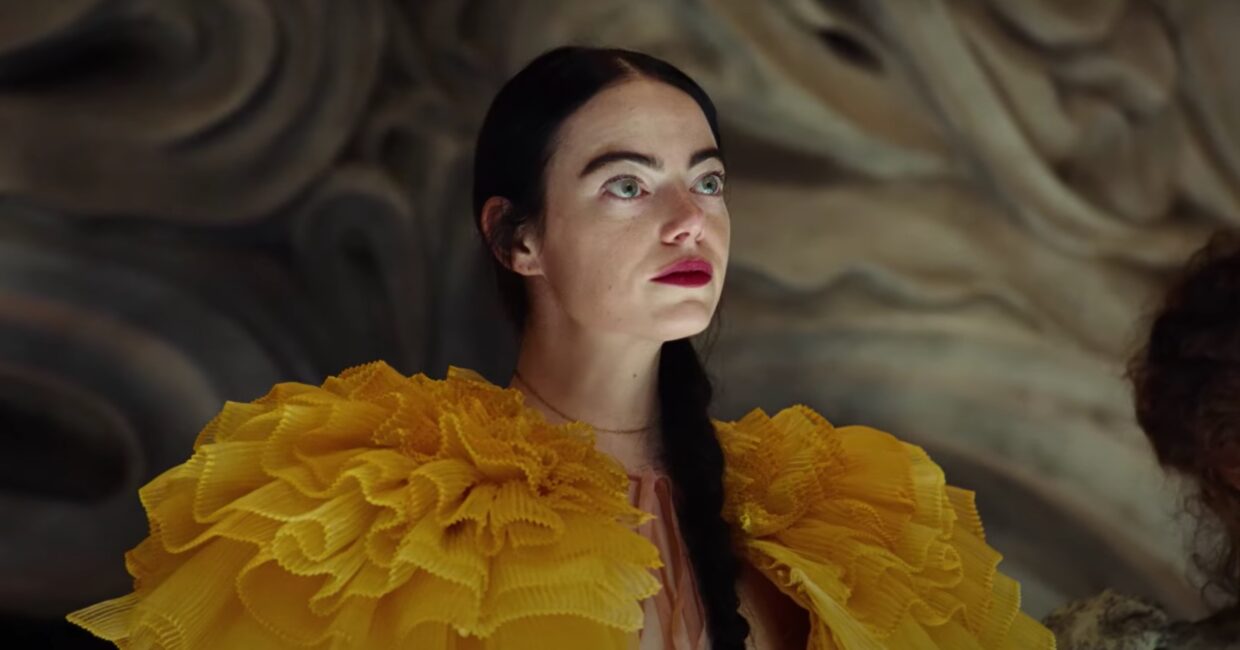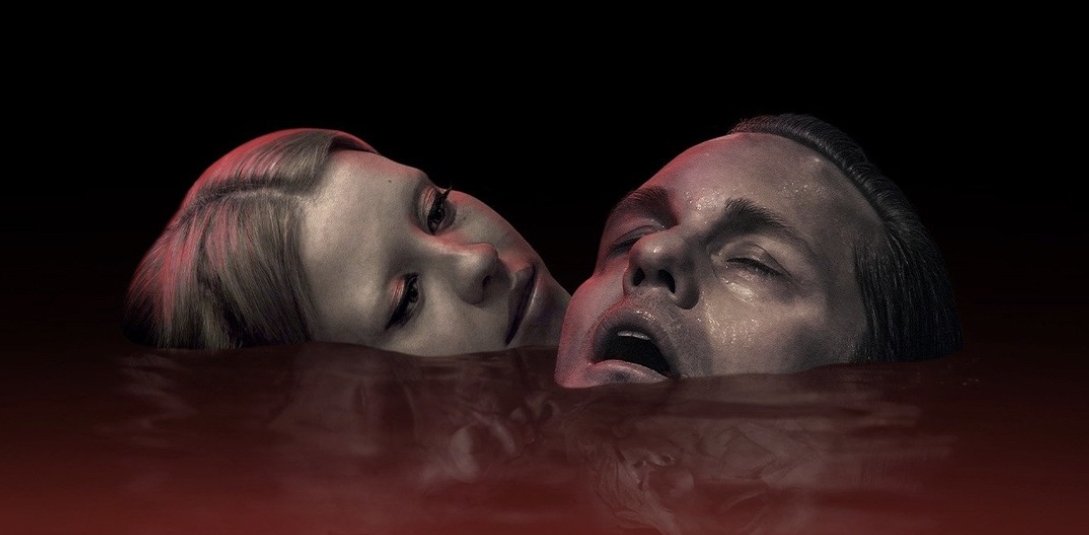
1984’s Revenge of the Nerds is a film that has not aged well. At all. This notion has been a little easier to accept shortcomings that become more obvious over time. The lead nerd of Louis having sex with a woman under a false identity is basically rape, the race and sexuality represented are stereotypes and the panty raid scene is…a dated juvenile antic, to say the least. But there’s more to the film being terrible than just a handful of problematic scenes that don’t play well anymore.
Upon its initial theatrical release, the film may have once been viewed as a triumph of the picked-on nerds finally fighting back against the bullying jocks of a college campus. And that may have been seen as revolutionary compared to most portrayals of nerds in film at the time, having always been portrayed as loser side characters. But at the end of the day, Revenge of the Nerds is just a 1980s sex romp, no different from the likes of Porky’s. And just like Porky’s, there are a lot of horny hijinks that do not stand the test of time.
The biggest problem with a film like Revenge of the Nerds is that its essence of rebellion is ruined by the ultimate desire of the nerds. The antagonist jocks of the Alpha Betas are portrayed as snobbish, mean, sexist and gross. But the problem is that our protagonists, the nerds of the Tri-Lambs, are also snobbish, mean, sexist and gross. The only difference is that the nerds are portrayed as weaker to make this more of a battle of brain versus brawn. With a few exceptions as to when the Alpha’s Ogre and the Tri-Lambs’ Booger have a belching content, which is just a battle of who is grosser. The nerds don’t want to be better than the jocks in terms of morality; they just want enough dominance to stay on campus.
It’s a war of power, not equality.
The film tries to not make this troubling aspect apparent in a few ways. One way is to showcase that the nerds are a diverse group for having members of other races and sexualities. Except, since the nerds are already overly exagerrated, the non-white and non-straight characters are given simplistic stereotype staging.
Toshiro Takashi is a Japanese student who wears thick glasses and speaks with a thick accent, calling a Frush in poker. Lamar Latrelle, played by Larry B. Scott, is a gay black student so, of course, he’s played up as overly effeminate and limp-wristed. Though Larry B. Scott did show up for the audition with glitter in his hair to fit the part, he is straight and after Revenge of the Nerds felt he had to over-compensate for his masculinity because of how overblown he portrayed his gay character. It also didn’t help that he played the character for all four Revenge of the Nerds movies.
When the nerds finally land a fraternity of Lamda Lamda Lamda, it’s an all-black fraternity. They may be seen as allies in a fight against discrimination but the nerds stumble over themselves when handling other races when for their first party with the Tri-Lambs, they put on a record of Old Man River. They quickly win back the black fraternity by supplying them with weed to smoke at the party and getting revenge on the opposing fraternity.
The climactic speech, ramped up with an emotional delivery and ending with a Queen song, may also fool one into believing this is a film about tolerance. The speech, mostly ad-libbed according to the actors, was meant to showcase how the nerds no longer had to be afraid and could be proud of themselves in public. It seems like an ending of acceptance but it’s to the tune of Queen’s We Are The Champions, subtly reinforcing that the nerds will inherit the Earth, not improve it.
The numerous uncomfortable scenes that everyone mentions are even more awkward when considering how the film was put together. After the uncomfortable scene where Louis has sex with Betty while in a mask to disguise himself as an Alpha Beta, he then reveals himself and she feels more impressed rather than, you know, raped. Lewis’ actor Robert Carradine was originally supposed to say the line “All jocks think about is sports. Ever since we’re ten, all we nerds ever think about is sex.” Carradine dropped the part about since we’re ten, considering the line is already pretty gross without thinking about nerds being sexual deviants before puberty. Julia Montgomery expressed how deeply uncomfortable she was during this scene and even Timothy Busfield, the actor who played Poindexter, thought that the scene should’ve been rewritten.
The panty-raid scene also showcases the full extent to how depraved the nerds truly are. It’s not just that they burst into the women’s dorms and steal their undergarments to the tune of Mission Impossible but that they then install cameras in the ceiling to transmit live feeds of the women in their rooms. After their raid, they proceed to watch footage of the women until dawn, meaning they most likely watched them sleeping. Lamar, not being interested in women, merely scoffs in disgust more as though the boys were just up all night drinking and not, you know, being voyeurs for an uncomfortable amount of time.
Defenders of Revenge of the Nerds may resort to the tired excuse of the film being from a different time, where there was more acceptance of this kind of humor. The argument rarely holds up with older and controversial films because most audiences only view the film as itself, neglecting the culture around it. They’d argue that because the film even existed in this era then it must’ve been socially acceptable. As an example, someone may excuse the blatant racism of The Birth of a Nation as just being the limited perspective of the era, except even a cursory glance of the NAACP’s reaction to that film argues the exact opposite.
And when looking at the critic reviews of Nerds upon its release, a lot of these gross elements were not overlooked. The Hollywood Reporter took note of its troubling aspects:
“Revenge of the Nerds is primarily the story of outcasts getting their just rewards, and that is always a satisfying movie ingredient. Nonetheless, this scattergun, often scatological film is filled with extensive racial stereotypes, which may offend some moviegoers.”
Lawrence van Gelder for The New York Times was much more vicious in his review:
“It is the absence of genuine comedy that exposes glaringly the film’s fundamental attitude of condescension and scorn toward blacks and women, and a tendency toward stereotyping that clashes violently with its superficial message of tolerance, compassion and fair play.”
Hey, you know who else thinks Revenge of the Nerds is kinda bad? The director of Revenge of the Nerds. Director Jeff Kanew admitted in an interview with GQ that the rape scene was kinda gross, stating:
“In a way, it’s not excusable. If it were my daughter, I probably wouldn’t like it.”
We shouldn’t have to make the jump to the extreme of a woman being raped being our daughter to find the very act of rape disgusting but at least the director is aware that such a scene is rather gross. At the very least, he didn’t defend it.
The most immediate response out of anyone who watches the film now is that such a film would never be made in today’s culture. Sometimes when people say this it comes with more nostalgia, as though the film were part of a somehow idealized vision of the world that has degraded with time. One may remark that the 1980s seemed freer and less divisive than times are today in our politically correct culture.
But the film really shouldn’t be spoken of with such rose-colored glasses. It’s not a bad thing that films like Revenge of the Nerds can’t be made nowadays with the same level of sexism, racism, and homophobia. We don’t even have to speculate that it couldn’t happen, considering that a Revenge of the Nerds remake was attempted in 2006 but was so abysmal after some time in the production that the whole project was scrapped. That being said, there does seem to be a reboot in the works from producer Seth MacFarlane with writers Keith and Kenny Lucas of 22 Jump Street fame. There’s clearly going to be some major restructuring of the Nerds story but we’ll just have to wait and see where they go with this. And, wow, is it going to be tiresome for all those standard think pieces from the geeky chuds about Revenge of the Nerds going woke.
What’s most telling about Revenge of the Nerds isn’t just its aged ugliness but what it implies nowadays. Back in the 1980s and indeed into the 1990s, nerdy and geeky things were fairly underground. Sometimes a sci-fi/comic book movie or video game would rise from the depths into the mainstream but it wasn’t as common. Being into Star Wars, Star Trek, D&D, comic books and video games once labeled you as a social misfit.
But now all that geeky stuff has migrated into the pop culture hemisphere. And with it comes the same reactionary engagement as unruly sports fans. The sense of entitlement and overreacting to your tribe either being attacked or not living up to your expectations. While this component was always a part of the geeky discourse to a degree, it was mostly relegated to a handful of the devout who took their fandom too seriously in smaller corners.
These reactionaries were not as highly publicized, their ranting and raving usually reduced to heated debates within chat rooms, dens, lunchrooms, and comic book shops. Now their rants have become the work of theater, spoken through YouTube with pleas for Patrons and taggings from sponsors upon each declaration. Their behavior compared to the geek debaters before the age of YouTube is no different. They seek the same thing as before; a devotion to keeping things the way they remember them; to honor the real fans and keep those normies away. And they’re profiting while doing so. It’s now a business to be an entitled geek, becoming a genre of videos all its own for those to get angry about a movie, show, comic book, or video game that either subverted or did not kowtow to the status quo.
Revenge of the Nerds functions as a prophetic vision of the future. The geeks and the nerds now control pop culture and social sway but most of them have no interest in changing the social structure that still marginalizes others. Many still have no interest in expanding the medium to be more inclusive of all genders, races, and sexuality. Any deviation from the traditional product they proclaim as their devoted passion is now considered more political than inclusive.
Thus, the term “political” has become the buzzword of decrying deviation, to the point where the mere acknowledgment of someone non-white, non-male and/or non-straight is labeled an act of forcing agenda or diversity. The inclusion, of course, is not devoid of stumbling, but for the vast number of over-protective and gatekeeping fans, this masterminding of marginalized people protruding in their media being negative and detrimental to their fandom is viewed as the default.
It’s a war of power, not equality.
The one scene that sums up the problems of the film is the scene of Takashi preventing himself from becoming drunk by ingesting trichloromethylene. This is not a real chemical compound. Its closest comparison would either be trichloroethylene, a hydrofluorocarbon which is harmful to drink, or trichloromethane, which is chloroform and would make you the opposite of less intoxicated.
And that’s Revenge of the Nerds; an aged and dated fantasy of an acceptance that isn’t real and if swallowed in earnest is toxic.

 “My Spy: The Eternal City” Review
“My Spy: The Eternal City” Review  “Deadpool & Wolverine” Review
“Deadpool & Wolverine” Review  “The Boys: Season Four” Review
“The Boys: Season Four” Review  “The American Society of Magical Negroes” Review
“The American Society of Magical Negroes” Review  “Twisters” Review
“Twisters” Review  “Sausage Party: Foodtopia” Review
“Sausage Party: Foodtopia” Review  “Robot Dreams” Review
“Robot Dreams” Review  “Godzilla x Kong: The New Empire” Review
“Godzilla x Kong: The New Empire” Review 


